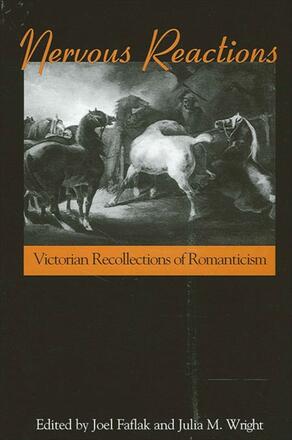
Nervous Reactions
Victorian Recollections of Romanticism
Alternative formats available from:
Addresses how Victorian receptions of Romanticism and Romantic writers were shaped by notions of "nervousness. "
Description
Nervous Reactions considers Victorian responses to Romanticism, particularly the way in which the Romantic period was frequently constructed in Victorian-era texts as a time of nervous or excitable authors (and readers) at odds with Victorian values of self-restraint, moderation, and stolidity. Represented in various ways—as a threat to social order, as a desirable freedom of feeling, as a pathological weakness that must be cured—this nervousness, both about and of the Romantics, is an important though as yet unaddressed concern in Victorian responses to Romantic texts. By attending to this nervousness, the essays in this volume offer a new consideration not only of the relationship between the Victorian and Romantic periods, but also of the ways in which our own responses to Romanticism have been mediated by this Victorian attention to Romantic excitability.
Considering editions and biographies as well as literary and critical responses to Romantic writers, the volume addresses a variety of discursive modes and genres, and brings to light a number of authors not normally included in the longstanding category of "Victorian Romanticism": on the Romantic side, not just Wordsworth, Keats, and P. B. Shelley but also Byron, S. T. Coleridge, Thomas De Quincey, Mary Shelley, and Mary Wollstonecraft; and on the Victorian side, not just Thomas Carlyle and the Brownings but also Sara Coleridge, George Eliot, Elizabeth Gaskell, Archibald Lampman, and J. S. Mill.
Contributors include D. M. R. Bentley, Kristen Guest, Joel Faflak, Grace Kehler, Donelle Ruwe, Alan Vardy, Lisa Vargo, Timothy J. Wandling, Joanne Wilkes, and Julia M. Wright.
Joel Faflak is Assistant Professor of English at Wilfrid Laurier University. Julia M. Wright is Canada Research Chair in English at Wilfrid Laurier University. She is the author of Blake, Nationalism, and the Politics of Alienation, the editor of The Missionary: An Indian Tale, and the coeditor (with Tilottama Rajan) of Romanticism, History, and the Possibilities of Genre.
Reviews
"In its 'nervous' focus, its consideration of a range of genres and literary institutions (reviews, editions, biographies), and its combination of theoretical sophistication and empirical groundedness, Nervous Reactions is a strong contribution to the field. " — University of Toronto Quarterly
"This book makes an extremely persuasive case for the end to the traditional disciplinary division in English between Romantic and Victorian periods. It demonstrates the compelling practical necessity for critics to abandon their entrapment within the Victorian construct of Romanticism, because they each open up new and manifestly promising areas of inquiry. " — Peter Melville Logan, author of Nerves and Narratives: A Cultural History of Hysteria in Nineteenth-Century British Prose